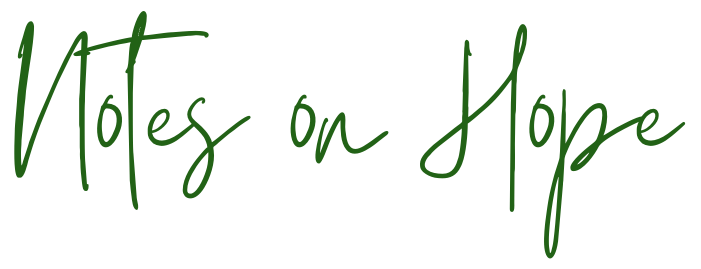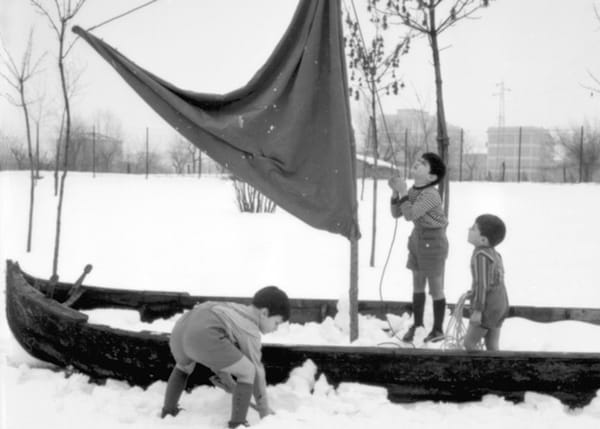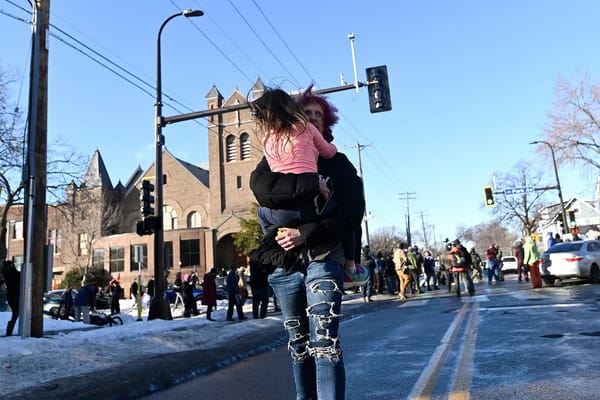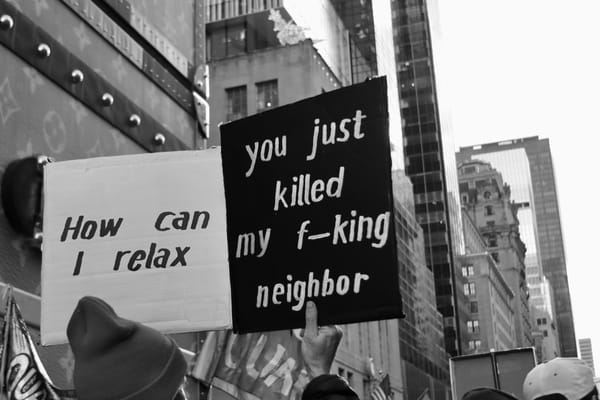Compassionate Imagination
Creating a real parenting village means giving each other some grace

“What would people look like
if we could see them as they are,
soaked in honey, stung and swollen,
reckless, pinned against time?”
~Ellen Bass
Most of the parenting experiences that have made me wish for the ability to travel back in time and respond differently have stemmed from the moments when I was conscious of being observed. Young children are masterful at conjuring an audience out of anonymous strangers by throwing a wild tantrum or by asking a question, loudly and publicly, that taps into our own insecurities and makes us feel like our very imperfect answer will be broadcast across the playground. And, of course, teenagers’ super power is their keen ability to cast a withering glare that seems to signal to anyone paying attention that we are inept, embarrassing, and just the worst.
When we feel this spotlight suddenly turned on us unexpectedly, the heat is often the surest prompt to either overreact or to quickly end an uncomfortable conversation that was worthy of sincere engagement. It is difficult to be our most thoughtful and reflective caregiving selves when we are focused on the flush in our own cheeks.
As I’ve written previously, these are some of the most important opportunities for repair. We will make mistakes, but we can return later to acknowledge our self-consciousness and tell our children how we wish we had reacted. They will have moments when they act out of embarrassment or uncertainty as well, and by sharing our own experiences of these feelings, we mend the unintended harm we may have caused, and we provide children with a little pebble of recognition that will brush against their hearts when they feel the spotlight rise on their own shortcomings. Perhaps that little pebble will help them to do better, to pause and act with intention instead of impulse. At the very least, it may remind them that we all step outside of our best selves sometimes, and when this happens repair and renewal are possible.
But I wonder if there is another vantage point worth considering. While we’ve all surely found ourselves the focus of anonymous judgment from time to time, we’ve certainly also been the ones looking on peripherally, making note, and squinting at someone else’s choices. While the pang of regret when we are at the center of unwanted attention can be strong, I’m not sure it’s as easy to notice when we are the ones casting a critical eye.
Just as feeling attention radiating towards us can make us hyper aware of our own limitations, keeping tabs on the limitations we observe in others can temporarily erase some of our self-doubt. We feel the heat of others’ eyes so intensely, because we’ve all cast those glances.
I’ve been thinking about these experiences—being either in the spotlight or in control of it—because I had a conversation recently with a friend about his own moment looking on from the side. He is someone who is persistently curious about other people and inquisitive about trying to understand perspectives different from his own. But, finding himself on the observational side of another families’ evening, he’d raised an eyebrow at their children’s use of screens and casually congratulated himself, with a slight competitive edge to his retelling, for not allowing the same. It was such a small and familiar moment. We all make these quick assessments, as we measure our own choices against the checks and balances of those around us. I’ve certainly done the same and might have in this instance, too. Parenting is filled with so much uncertainty; it feels good, necessary even, to be able to pat ourselves on the back now and then.
There are important conversations to be had about the role of screens in children's lives (and our own), but as our conversation continued I began to feel that it might also be worthwhile to consider in these instances—whatever it is that may spark our critical gaze—how little we usually know about the circumstances that lead to other people’s choices.
Listening to my friend’s anecdote, I started to think, as a teacher, about all the unique needs children can have that sometimes lead us to find we have to make a choice we wouldn’t otherwise have considered, because it’s what that individual child needs. And, as a parent with more than a decade in the trenches, I also thought of all the long days where, by dinnertime, the path of least resistance can begin to feel like the only sanity-preserving option.
Maybe this family had had an exhausting, difficult day and didn’t have the capacity to hold the line on one more rule. Or maybe they were at the end of a wonderful day together, and this was simply not a hill the parents had chosen to die on, among the many hills we have to pick, as they tried to preserve the glow of the day. There are also developmental needs that can make busy, public places tricky and overwhelming for some children, creating a genuine need for distraction. As we talked, my friend pointed out that the more likely explanation was that it’s simply hard to say no to our children, so parents often avoid doing so. This is a valid point, and children do sometimes need us to set clear limits, even when it’s hard. But it also left me wondering if determining the most likely explanation matters when we are on the sidelines of other people’s lives?
As an alternative, when we find ourselves in the observer’s seat, what might happen if we nudged ourselves to imagine multiple possible stories about other people’s lives, regardless of what may seem most likely? When we practice connecting through our common struggles—because, let’s face it, we all have parenting moments we’d rather not be measured by—instead of disconnecting through an instinct for competition and certainty, I think we might find that our own moments in the spotlight are less painful. The stories we conjure about other people can reinforce our own sense of rightness, or they can soften us towards each other as we infuse our understanding with multiple possibilities. There is a specific kind of compassion that grows from acknowledging that we never fully know what challenges might be humming in the background of other people’s lives.

As Chimamanda Ngozi Adichie writes, stories have power. They can change our perception of individuals, of ourselves, and even of entire cultures, so she urges us to allow for and cultivate a multiplicity of narratives. She says,
“Many stories matter. Stories have been used to dispossess and malign. But stories can also be used to empower and to humanize. Stories can break the dignity of a people. But stories can also repair that broken dignity.”
What if, when we are tempted to assume the worst or even just the easiest explanation for someone else’s behavior, we instead reminded ourselves to imagine the multiple possible unknown stories that might be pulsing beneath their visible actions?
I think the question that naturally follows is whether taking this expansive and empathetic stance runs the risk of excusing harm and reducing accountability. The parenting moment that my friend described was a very low stakes moment. But the dubiousness of absolving responsibility for individual choices was the deeper perspective he was trying to convey in our conversation, and it is an important point to consider. Is there a point at which compassion transforms into permission?
But here’s the rub. Research indicates that, in most cases, the opposite is true. Compassion, even when it feels the most difficult to offer, even when a genuine wrong has been committed, and even when the stakes are high, is the most likely route to accountability and even to a change in beliefs and behaviors. It may be more difficult and less satisfying, at least in the short term, and it usually feels counterintuitive. But it’s not only the kinder option. It’s also more impactful. We are usually more likely to embrace change when we are engaged on an emotional and motivational level, with understanding and without shame. This necessitates a starting point of empathy and curiosity. This does not mean that we need to accept harm. But it does call into question the idea that putting aside judgement and seeking understanding inherently risks enabling harm. Sometimes this might just be what we tell ourselves to justify preserving the momentary high of feeling a little less fragile and fallible than someone else. In doing so, we might even be sacrificing the potential for accountability and transformation by prioritizing our own rightness.
As bell hooks explained, bringing about accountability and change in another person is only possible when we are able to, “remain in touch with their humanity enough to believe in their capacity to be transformed.”
Poet and performance artist Alok also speaks about the potential for transformation existing when we are able to offer our compassionate imagination to others, instead of judgement and assumptions. Even when confronted with intense anger, Alok insists on a response that presumes there are always experiences and precursors in other people’s lives that we can’t fully know. They write,
“I believe now in the potential for transformation, our continual becoming, because I have experienced it firsthand…I believe you are worth more than conditional acceptance…I want to be in the audience at the open mic and hear about who broke your heart.”
Even when we think we are merely onlookers, the tenor of the gaze we cast has an impact. Our behavior is shaped, not only by what others communicate directly, but by the expectations we perceive in them, whether spoken or not. In research contexts, this is termed the observer-expectancy effect. Our assumptions can cause subtle shifts in our affect, which can in turn alter the behavior of those being observed, as can their assumptions about what we might expect. Our assumptions, even when we think they are only in our own minds, impact others, because the human brain is so exquisitely sensitive to the vibrations of the social web.
The glare of unspoken criticism, even when subtle, can entrench us. We dig in when we feel the squint of judgment, and we become harder, edgier, more self-protective, and less open. The sensation of a compassionate gaze, on the other hand, can feel like relief. It allows us to breathe. And, as we relax, we become more able to shift course.
An accumulation of these encounters changes both the observer and the observed. We each have the capacity, through these brief exchanges, to either become more stuck or more flexible and connected. As parents, when we look upon other families through a lens of compassionate imagination instead of competition, we expand and strengthen the “village” we often speak of by tending to the threads of understanding and alliance that bolster community ties. It is easier to entrust our children to a community of neighbors whom we feel are looking out for us rather than looking to one up us.
I’m reminded of the picture book, Milo Imagines the World, in which a little boy, filled with his own worries, learns to imagine all the possible lives the people he watches on the subway might be leading. He learns to do this after discovering that another child, whose life he had assumed was radically different from his own, in fact shares a significant connection with him. Learning this opens little Milo up to questioning his own assumptions, and in doing so, he becomes less anxious and less isolated, and the world around him becomes more enticing, interesting, optimistic, and interconnected. His community and his sense of his place in it expands.
As good as the little moments that seem to confirm our own rightness may feel, they are transient. But we might find that building a habit of catching ourselves in these small moments and choosing to engage in a practice of compassionate imagination—of considering many possible stories and explanations—would feel better, both to us and to those we look upon. And, as these small low-stakes moments accumulate, they might even prove to be the fertilizer for meaningful accountability, transformation, and community when the stakes are higher.
Wishing you a soft gaze and a community of care,
Alicia
If you think someone else in your life might enjoy reading Notes on Hope, please share. It’s always easier to hold onto hope when we are not doing it alone.





